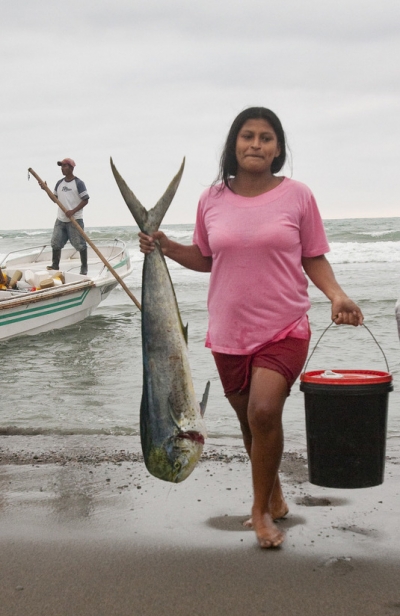When investments in fisheries are made to alleviate poverty and food security, insufficient data on the health of world fish stocks makes it difficult to determine whether these programs are achieving their goals. To address this issue, major information gaps need to be identified, and fishery statuses must be evaluated by increasing coverage of stock status and management databases and synthesizing data.
OUR APPROACH: This team synthesized data to assess the status of key fish stocks, which informed a systematic analysis of all the factors that lead to good outcomes in fisheries management.

The Triple Bottom Line
There is considerable potential for more catch, more profit, and higher fish abundance worldwide – a “triple bottom line.” This potential is especially high in South and Southeast Asian countries with very large, mostly unregulated fisheries.
A Global Dichotomy of Fisheries Management
The team found that there is great contrast among global fisheries management systems, with top scoring countries routinely using 90% of the elements of fisheries management systems, and lowest scoring countries using very few of these elements.
Drivers of Stock Recovery
The team found that the dominant explanation for fish stock recovery has been the level of fishing pressure. When fishing pressure was reduced, stocks generally recovered, but if fishing pressure remained too high, stocks could not rebound. Tentative explanations for why fishing pressure has declined in some areas and not in others include: 1) the implementation of a legal framework requiring sustainable fishing, and 2) specific management tools such as annual catch limits.

“The status of fish stocks depends largely on the management system. If overfishing is occurring and reducing fishing pressure that means the stock abundance will increase, economic performance of the fishery will be better, and higher catches can result. If management agencies restrict fishing pressure their fisheries can be sustained at a high level.”
– Ray Hilborn, Team Leader
In this Fish and Fisheries paper, the team evaluated trends in tuna and billfish stocks, finding that stocks were more depleted if they had high commercial value, were long‐lived species, had small biomass before intensive fishing, and were subject to intense fishing pressure for a long time.
In this PNAS publication, the team synthesized and analyzed data from 4,713 fisheries worldwide, representing 78% of global reported fish catch, to estimate the status, trends, and benefits of alternative approaches to recovering depleted fisheries.
Team member Chris Costello and team lead Ray Hilborn presented the team’s research in this webinar, demonstrating how governance and management reform can reduce poverty while achieving economic gains, increasing food production, replenishing fish and conserving ocean health for future generations.
This report provides an overview of the biological status of fisheries stocks around the world, and relates measures of stock status to the strength of fisheries management.